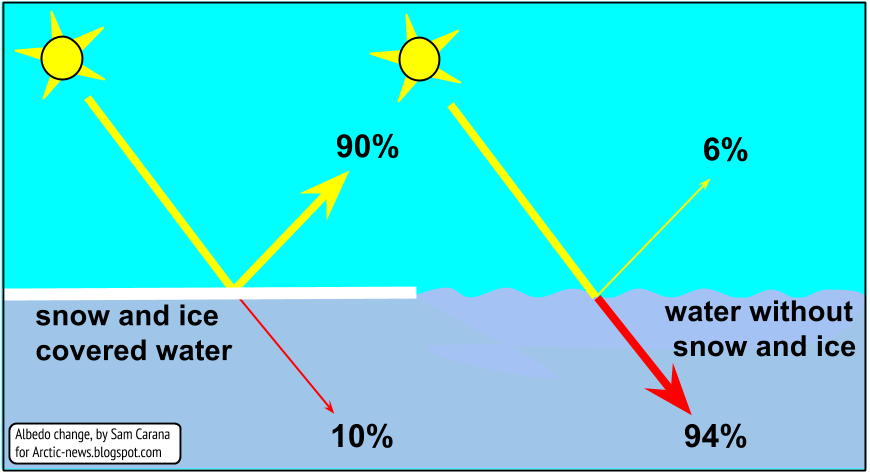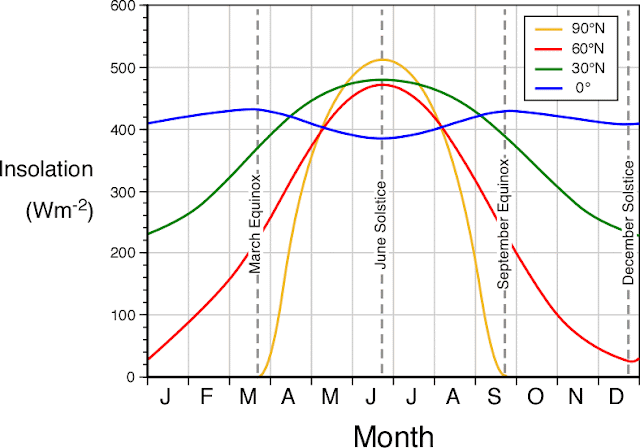How likely is an Arctic Blue Ocean Event (BOE) to occur in 2024? The image below is alarming.
Could the temperature increase even more over the next few months? As the above image also shows, the highest annual temperatures were typically reached in March for each of the previous years on record, except for 2023 when the current El Niño started to emerge. According to NOAA, the majority of models indicate that this El Niño will persist through March-May 2024.
The conclusion is that ocean heat is the main reason why melting of Arctic sea ice can occur early in the year. More specifically, the narrowing of the temperature difference between the Arctic and the Tropics can at times cause strong wind to be present along the path of the Gulf Stream. Rising ocean heat combined with strong wind can cause heat to move abruptly toward the Arctic Ocean, causing sea ice to fall in extent.
Such an event is illustrated by the image below, adapted from NSIDC. The image shows a drop in sea ice extent at the end of January 2024 (blue), a time of year when Arctic sea ice is still expected to increase in extent and to keep increasing in extent for some time to come (grey). In this case, strong wind may have caused a huge amount of ocean heat that is present in the North Atlantic to move abruptly toward the Arctic Ocean, as discussed in an earlier post.
Feedbacks
Changes to the Jet Stream and ocean heat accumulating in the North Atlantic Ocean are feedbacks of the overall temperature rise. A further rise in ocean heat in combination with the steep rise in insolation hitting the Arctic in April and May could suffice to cause a Blue Ocean Event (BOE) to occur in 2024.
A BOE occurs when virtually all sea ice disappears and less than 1 million km² of sea ice remains. As the sea ice disappears, the surface color changes from white (sea ice) to blue (ocean) resulting in far less sunlight getting absorbed by the Arctic Ocean, instead of getting reflected back into space as it previously did.
 |
| [ Albedo change, from the Albedo page ] |
Albedo change constitutes a self-reinforcing feedback loop, i.e. the more sea ice disappears, the more sunlight gets aborbed by the Arctic Ocean, further accelerating sea ice melting.
Next to the albedo loss, there is loss of the latent heat buffer constituted by the sea ice. Latent heat is energy associated with a phase change, such as the energy consumed when solid ice turns into water (i.e. melts). During a phase change, the temperature remains constant. Sea ice acts as a buffer that absorbs heat, while keeping the temperature at about zero degrees Celsius. As long as there is sea ice in the water, this sea ice will keep absorbing heat, so the temperature doesn't rise at the sea surface.
 |
| [ Latent Heat Buffer, from the Albedo page ] |
The amount of energy absorbed by melting ice is as much as it takes to heat up an equivalent mass of water from zero to 80°C.
There are many further feedbacks, such as changes to the Jet Stream, as also discussed at the feedbacks page.
Climate Emergency Declaration
Links
• Blue Ocean Event
https://arctic-news.blogspot.com/p/blue-ocean-event.html
• Climate Reanalyzer - Daily Sea Surface Temperature, World (60°S-60°N)
https://climatereanalyzer.org/clim/sst_daily
• Pidwirny, M. "Earth-Sun Relationships and Insolation". Fundamentals of Physical Geography, 2nd Edition (2006)
http://www.physicalgeography.net/fundamentals/6i.html
• NOAA - ENSO: Recent Evolution, Current Status and Predictions
https://www.cpc.ncep.noaa.gov/products/analysis_monitoring/lanina/enso_evolution-status-fcsts-web.pdf
• NSIDC - Arctic sea ice extent
https://nsidc.org/arcticseaicenews/charctic-interactive-sea-ice-graph
https://arctic-news.blogspot.com/2024/01/potential-temperature-trends.html
https://arctic-news.blogspot.com/p/cold-freshwater-lid-on-north-atlantic.html
• Albedo and more
https://arctic-news.blogspot.com/p/albedo.html
• Latent Heat
https://arctic-news.blogspot.com/p/latent-heat.html
• Jet Stream
• Pre-industrial
https://arctic-news.blogspot.com/p/pre-industrial.html
• Extinction
https://arctic-news.blogspot.com/p/extinction.html
• Climate Plan
https://arctic-news.blogspot.com/p/climateplan.html
• Climate Emergency Declaration
https://arctic-news.blogspot.com/p/climate-emergency-declaration.html

 10 months ago
63
10 months ago
63






